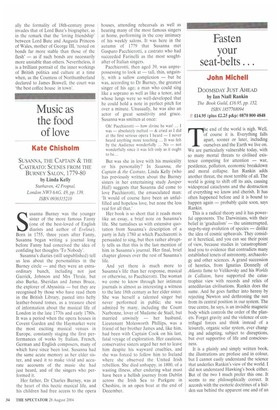Music as the food of love
Kate Chisholm
SUSANNA, THE CAPTAIN & THE CASTRATO: SCENES FROM THE BURNEY SALON, 1779-80 by Linda Kelly Starhaven, 42 Frognal, London NW3 6AG, £9, pp. 139, ISBN 0936315210 Susanna Burney was the younger sister of the more famous Fanny (one of the best-loved of English diarists and author of Evelina). Born in 1755, three years after Fanny, Susanna began writing a journal long before Fanny had conceived the idea of confiding her thoughts 'To Nobody'.
Susanna's diaries (still unpublished) tell us less about the personalities in the Burney circle — and they were an extraordinary bunch, including not just Garrick, Johnson and Mrs Thrale, but also Burke, Sheridan and James Bruce, the explorer of Abyssinia — but they are recognised by those who have read them in the British Library, pasted into hefty leather-bound tomes, as a treasure chest of information about the musical life of London in the late 1770s and early 1780s. It was a period when the opera houses in Covent Garden and the Haymarket were the most exciting musical venues in Europe, constantly staging the first performances of works by Italian, French, German and English composers, many of which have since been lost. Susanna had the same acute memory as her elder sister, and used it to make vivid and accurate accounts of the music she had just heard, and of the singers who performed it.
Her father, Dr Charles Burney, was at the heart of this hectic musical life, and his children had free access to the opera houses, attending rehearsals as well as hearing many of the most famous singers at home, performing in the cosy intimacy of his weekly salons. It was here in the autumn of 1779 that Susanna met Gasparo Pacchierotti, a castrato who had succeeded Farinelli as the most soughtafter of Italian singers.
Pacchierotti, then aged 39, was unprepossessing to look at — tall, thin, ungainly, with a sallow complexion — but he was, according to Dr Burney, the greatest singer of his age; a man who could sing like a soprano as well as like a tenor, and whose lungs were so well-developed that he could hold a note in perfect pitch for over a minute. Unusually, he was also an actor of great sensitivity and grace. Susanna was smitten at once:
Oh! Pacchierotti — how divine he was! ... I was — absolutely melted — & cried as I did at the first serious opera I heard — I never heard anything more touching ... It was felt by the Audience wonderfully ... No — not wonderfully since it was felt only as it ought to be...
But was she in love with his musicality or his personality'? In Susanna, the Captain & the Castrato, Linda Kelly (who has previously written about the Burney sisters in her entertaining study Juniper Hall) suggests that Susanna did come to love Pacchierotti, the emasculated man: 'It would of course have been an unfulfilled and hopeless love, but none the less real for all that.'
Her book is so short that it reads more like an essay, a brief note on Susanna's life. She tantalises us with extensive quotation from Susanna's description of a party in July 1780 at which Pacchierotti is persuaded to sing, but then rather abruptly tells us that this is the last mention of him in Susanna's journal. Her final, brief chapter glosses over the rest of Susanna's life.
And yet there is much more to Susanna's life than her response, musical or otherwise, to Pacchierotti. The woman we come to know through her intimate journals is almost as interesting a witness to the late 18th century as her elder sister. She was herself a talented singer but never performed in public; she was admired by many, including the Count Narbonne, lover of Madame de Stael, but married unwisely — her husband, Lieutenant Molesworth Phillips, was a friend of her brother James and, like him, had been with Captain Cook on his last, fatal voyage of exploration. Her cautious, conservative sisters urged her not to leave him despite his wayward cruelties, and she was forced to follow him to Ireland where she observed the United Irish rebellion. She died unhappy, in 1800, of a wasting illness, after enduring what must have been a hellish journey from Dublin across the Irish Sea to Parkgate in Cheshire, in an open boat at the end of December.


























































 Previous page
Previous page